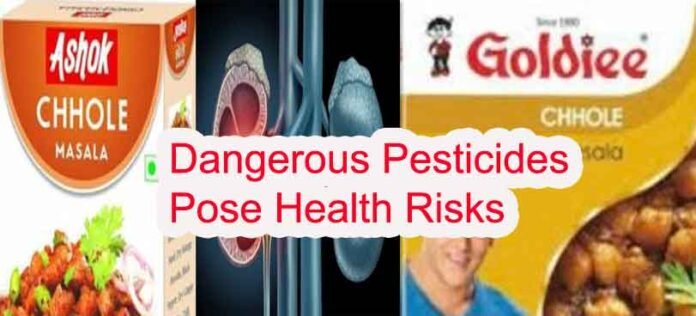Spices from 16 companies, including popular brands like and Bhola, have failed safety tests due to dangerous pesticides. Discover how these harmful contaminants can affect your liver and kidneys, and what actions are being taken to protect consumers.
INVC NEWS
New Delhi : In the vibrant world of Indian cuisine, spices play a pivotal role, adding flavor, color, and aroma to dishes. However, a recent scandal has cast a shadow over this beloved aspect of our food culture. Samples from 16 spice companies, including household names like Goldie, Ashok, and Bhola, have failed safety tests, revealing dangerous levels of pesticides and contaminants. This alarming discovery by the UP Food Safety and Drug Administration (FSDA) raises serious health concerns, highlighting the potential for severe damage to the liver and kidneys. Let’s delve deeper into this spicy scandal and uncover the dangers lurking in our kitchens.
The Spicy Scandal: An Overview
The FSDA Investigation
In May this year, FSDA officials conducted a series of raids on spice companies in Kanpur, one of the major hubs for spice production in India. They collected samples of 35 different spice products from 16 companies and sent them to Agra for rigorous testing. The results were shocking: out of the 23 reports received, a significant number revealed dangerously high levels of pesticides and insecticides. The implicated brands included:
- Goldie
- Ashok
- Bhola
These findings prompted immediate action, leading to a ban on the sale of these contaminated products.
The Impact on Consumers
The harmful elements found in these spices can wreak havoc on the human body. Regular consumption can lead to:
- Respiratory issues: Tears and cough due to inhalation of contaminants.
- Cardiac problems: Adverse effects on heart health.
- Liver damage: Toxic substances affecting liver function.
- Kidney damage: Pesticides causing renal issues.
The widespread distribution of these spices across major cities, including Kanpur, Gorakhpur, Jaunpur, Jhansi, Varanasi, Fatehpur, and Bahraich, exacerbates the potential health crisis.
The Culprits: Dangerous Pesticides and Contaminants
Ethylene Oxide: A Silent Killer
One of the most alarming substances found in the contaminated spices is ethylene oxide. According to the Spice Board, this flammable and colorless gas, which forms at temperatures above 10.7°C, is used as a disinfectant and sterilizing agent. However, it is also a potent pesticide. The World Health Organization’s International Agency for Research on Cancer classifies ethylene oxide as a Group 1 carcinogen, meaning there is enough evidence to conclude that it can cause cancer in humans. The types of cancer it can cause include:
- Lymphoma
- Leukemia
- Stomach cancer
- Breast cancer
Carbendazim and Propargite: Health Hazards
Another dangerous pesticide found in the spices is carbendazim, commonly used to control mold. Its side effects are severe, including:
- Heart problems
- Kidney damage
- Infertility
- Reproductive issues
Propargite, an arachnicide used against spiders, was also detected. Its use in agricultural fields translates into contaminated spices, posing significant health risks to consumers.
The Response: FSDA’s Actions and Consumer Protection
Raids and Sample Collection
In a bid to protect public health, FSDA officials raided 13 spice factories in May. They collected 35 samples from various factories and sent them for lab testing. The results led to immediate action, including issuing notices to the companies involved.
Banning Contaminated Spices
Upon receiving the alarming test results, FSDA promptly banned the sale of the contaminated spices. This swift action aimed to prevent further health risks to consumers. The companies affected by the ban include:
- Shubham Goldie Masala Company: Producing unsafe Sambar Masala, Chat Masala, and Garam Masala.
- Two Ashok Masala Companies: Products like coriander powder, garam masala, and matar paneer masala found unfit for consumption.
- Bhola Masala: Containing harmful substances.
Legal and Financial Repercussions
FSDA has issued notices to the owners of the companies whose spice samples failed the tests, demanding answers. If the responses are unsatisfactory, legal action will follow, including cases filed in city courts and hefty fines imposed on the offending companies.
Consumer Safety: What You Can Do
Be Informed and Vigilant
As consumers, it is crucial to stay informed about the brands you trust and use. Keep an eye on news related to food safety and recalls. Being aware of the ongoing issues with specific brands can help you make safer choices.
Check for Certifications
Look for certifications from reputable organizations that indicate a product has undergone rigorous testing and meets safety standards. Certifications from the Food Safety and Standards Authority of India (FSSAI) and other recognized bodies can offer some assurance of product quality.
Opt for Organic and Locally Sourced Spices
Whenever possible, opt for organic spices that are less likely to be contaminated with harmful pesticides. Supporting local farmers and small businesses that adhere to organic farming practices can also be a safer and more ethical choice.
Proper Storage and Handling
Ensure that spices are stored properly in airtight containers to prevent contamination. Handling spices with clean utensils and in a hygienic environment can also reduce the risk of ingesting harmful substances.
Frequently Asked Questions (FAQs)
What are the health risks of consuming contaminated spices?
Contaminated spices can cause a range of health issues, including respiratory problems, heart issues, liver and kidney damage, and even cancer due to harmful pesticides like ethylene oxide and carbendazim.
How did the FSDA discover the contamination?
FSDA officials conducted raids on spice factories in Kanpur and collected samples for testing. The laboratory results revealed high levels of dangerous pesticides and contaminants in the spices.
What actions have been taken against the companies involved?
FSDA has banned the sale of contaminated spices, issued notices to the companies, and plans to file legal cases against them. Hefty fines are also expected for the offending companies.
How can consumers protect themselves from contaminated spices?
Consumers should stay informed, check for safety certifications, opt for organic and locally sourced spices, and ensure proper storage and handling of spices to minimize risks.
Are all spices from these brands unsafe?
Not all products from these brands may be unsafe, but the specific batches tested were found to be contaminated. It is advisable to avoid products from these brands until further notice from regulatory authorities.
The discovery of dangerous pesticides in spices from 16 major companies is a stark reminder of the importance of food safety. While spices are an integral part of Indian cuisine, the presence of harmful contaminants poses serious health risks. The swift action by FSDA in banning these products and pursuing legal action against the companies involved is a step in the right direction. As consumers, staying informed and vigilant can help protect our health and ensure that the spices we use in our kitchens are safe and free from harmful substances.
In the end, the integrity of our food supply chain is paramount. This scandal serves as a wake-up call for stricter regulations and more rigorous testing to safeguard public health. Let’s hope for a future where the spices that bring zest to our lives are not tainted with hidden dangers.
















